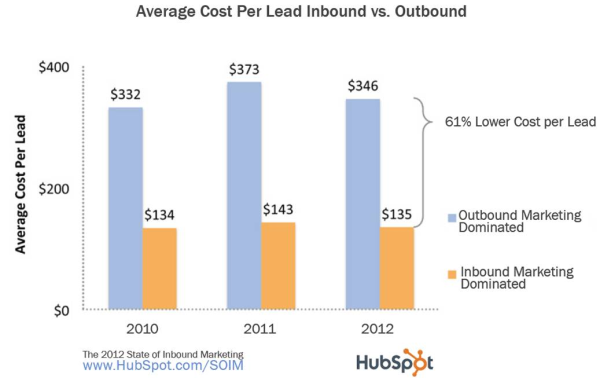Topics:
Inbound MarketingSubscribe now and get the latest podcast releases delivered straight to your inbox.
 I think it's pretty safe to assume that all businesses are looking for the same two things; more quality leads and cost savings. In some form, this is every company's business model.
I think it's pretty safe to assume that all businesses are looking for the same two things; more quality leads and cost savings. In some form, this is every company's business model.
To acquire more customers via sales ready leads, and do so by keeping costs down. The problem is, more companies than not are shooting themselves in the foot when it comes to their lead generation, as their cost per lead is so high, it's almost as if they need to make a sale simply to cover the cost of acquiring them in the first place.
This is extremely counter-productive, and if this sounds like you, time to reevaluate your lead generation and ways in which you can lower your cost per lead. Lucky for you, we've compiled a list of five steps to help you lower your cost per lead and as a result, have a more profitable marketing campaign.
Interested in learning more about how to lower your cost per lead? Give us a call at IMPACT and learn how we can help!
Five Ways to Lower your Cost Per Lead
1. Reevaluate your Marketing
The first step requires some soul searching. Are your current marketing efforts effective in getting the most out of your marketing budget? Forget for second how many leads or customers you acquired last month, and instead focus on how much it cost to acquire them. Are you as profitable as you can be?
Is your company still relying on outdated outbound marketing methods to generate business and leads?
Outbound marketing, in years past, was the traditional method of advertising. Prior to the Internet marketing boom, businesses relied on direct mail, trade shows, and telemarketing to help promote their business and acquire customers. It was a way of pushing their message to prospects.
With the advent of the Internet and the digital age came inbound marketing, a method focused on attracting prospects rather than pushing a message on them.
So how does inbound compare to outbound? According to a study by HubSpot, the average outbound lead is $346, whereas the average inbound lead is only $135. The remaining four steps will further illustrate these savings.

2. Organic Search
Organic search refers to the amount of people who find your website organically, or through the search engines rather than a pay-per-click campaign.
Did you know that 78% of Internet users conduct product research online?
This makes ranking high in Google all the more important in regards to your online lead generation. And here's the kicker, ranking high in Google is free! While it's not definitely not easy to rank high in the search engines, by implementing SEO best practices, your website and pages can be ranking higher and delivering more qualified leads.
By conducting keyword research and analysis, you'll effectively identify which keywords offer the best opportunity for getting found online as well as ranking higher in search engines. Google has essentially become the new yellow pages, with the only difference being is that it's free to rank in Google.
So by cutting out ineffective print advertising and instead focus on strengthening your SEO to rank higher in search engines, you'll effectively generate more leads for far less money.
3. Blogging
According to the HubSpot study, blogging had the highest instance of being reported as "below average cost."
Blogging has proven to be the most effective way of driving more qualified traffic to your website, as the more pages you have indexed for the search engines, the higher probability you have of getting found, which is the whole idea behind inbound marketing.
Companies that blog generate 55% more traffic than those who don't, so it's certainly proven to be a valuable marketing tactic. Your blog posts offer further opportunities to implement SEO best practices, as each article can be fully optimized to help drive more traffic back to your website.
4. Social Media Marketing
Perhaps the symbol of the digital age are the social media platforms we all use to communicate and stay connected on. And just like the other inbound marketing methods, it costs nothing to implement and use. By sharing valuable content from your website, or simply your expertise in the field will go a long way toward garnering a large and loyal following.
Just as important is engaging with them however, as this is a great way of staying in tune with your niche market and what they need and are looking for. Social media, and Facebook in particular, is basically free advertising. Users look at Facebook not only for their personal relationships, but also to gather information on companies and products.
5. Email Marketing
Direct mail can be expensive, and given the low tolerance people now have for solicited advertising, it often times ends up in the trash along with your wasted dollars. Email marketing however, is much more targeted, especially when used with HubSpot's marketing software. By creating segmented lists containing specific leads and how they were attained, you can more effectively create an email marketing campaign far more effective (and far less cheaper) than any direct mail campaign.
Get More From your Marketing Dollars
By implementing an inbound marketing campaign focusing on attracting leads rather than pushing advertisements toward them, you will dramatically decrease your cost per lead, resulting in a higher profit margin and more sales ready leads.
Interested in learning how to implement a successful inbound marketing campaign? Give us a call at IMPACT and learn how we can help you get started!
Free Assessment:

